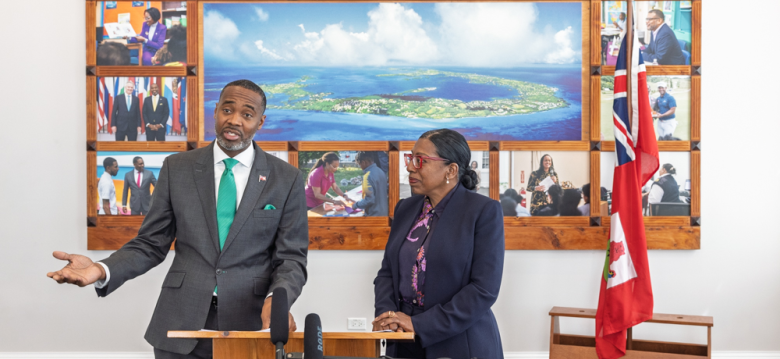
Good morning members of the media,
It is a privilege to stand before you today as we chart the course for legal and justice reform in this new legislative year. The Speech from the Throne, delivered last Friday, set out an ambitious and necessary agenda—one that is designed to enhance the rule of law, ensure access to justice, and strengthen our democratic and legal institutions.
It is my duty as Attorney General to ensure that these commitments are translated into action. Today, I will outline the initiatives within my Ministry's remit and their rationale.
The law must be a living instrument responsive to our society's evolving needs. Yet, too often, laws that were once considered progressive become obsolete and misaligned with contemporary realities. To remedy this, the Government will reinstate the Law Reform Commission, a critical advisory body dedicated to modernising criminal and civil law.
A well-resourced, active, and independent Commission will ensure that Bermuda’s legislative framework remains robust, equitable, and efficient. This is not about mere theoretical reform but about addressing fundamental gaps in our justice system, resolving outdated legal ambiguities, and ensuring that our laws serve the people they are intended to protect.
The law is built upon the principle of fairness, and justice cannot be served when legal representation is inaccessible. Legal Aid ensures that justice is not reserved for the privileged few but is available to all, regardless of economic status. However, our current system requires a fundamental reassessment to ensure that it is both equitable and sustainable.
This Government will therefore undertake a comprehensive review of Legal Aid to determine how we can best uphold access to justice while improving efficiency and ensuring that those who need assistance receive it. Legal representation is a right, and we must ensure that right is protected.
Justice is not merely about punishing wrongdoing but correcting miscarriages of justice. We have witnessed cases in which individuals have been wrongfully convicted and imprisoned, their lives upended by failures in the system.
To address this, we will introduce a statutory framework for the compensation of wrongfully convicted persons. While financial compensation cannot undo years lost, it can recognise the harm caused and help to restore dignity to those affected. The right to redress must not be discretionary but codified and guaranteed under law.
Our children—particularly those in state care—deserve the most potent legal protections possible. The Children Act 1998 has served as the foundation for child welfare laws, but as our society evolves, so must our legal frameworks.
The Government will therefore conduct a full-scale review of the Children Act, under the leadership of Minister Tinee Furbert, to ensure it aligns with modern best practices, particularly regarding adolescent mental health challenges. With increasing rates of childhood trauma and psychological distress, it is imperative that our laws provide adequate protection, interventions, and rehabilitative mechanisms for children in need.
We cannot simply maintain the status quo; we must ensure that our system is fully equipped to address the complexities of child welfare in 2025 and beyond.
To bring the treatment of juvenile offenders into alignment with international human rights standards and contemporary research on adolescent development, we will raise the minimum age of criminal responsibility from 8 to 14. Any modern justice system recognises that that the criminalisation of children, a relic of times gone by, must be abolished. We must continue to focus on early intervention, education, and community-based support systems rather than punitive measures that can irreparably harm young lives. This amendment is merely the first step in a planned phased overhaul of the Young Offenders Act 1950.
Our democracy is a living institution, and its strength lies in its ability to adapt to contemporary realities. The Government has initiated a consultative electoral and constitutional reform process, culminating in a report for the Legislature's consideration.
It is important to remember that genuine universal adult suffrage was only fully realised in Bermuda in 2003. Therefore, it is incumbent upon us to continue refining our democratic system to ensure that it remains responsive, inclusive, and reflective of the people’s will.
Additionally, with the conclusion of legal proceedings related to the Commission of Inquiry into Historic Land Losses, the Legislature will be invited to examine the report's findings and its recommendations. This is about ensuring justice for those who have suffered from historical injustices and addressing unresolved grievances with the seriousness they deserve.
The administration of justice cannot be solely punitive. As a society, we must prioritise rehabilitation, crime prevention, and restorative justice over retribution.
This is why the Government will continue to implement the National Violence Reduction Strategy, under the leadership of the Minister of National Security, Minister Weeks. This a comprehensive initiative aimed at addressing the root causes of crime, supporting at-risk individuals, and breaking the cycle of violence that has affected too many families in Bermuda.
The goal is not simply to prosecute crime but to prevent it from occurring. Investing in education, rehabilitation programmes, and social services can create a justice system that promotes accountability and personal growth rather than perpetual incarceration.
This legislative year will be transformative for Bermuda’s legal landscape. The work ahead is substantial but essential because justice, at its core, is about fairness, accountability, and the unwavering commitment to upholding the rule of law.
Thank you. I will now invite your questions.
